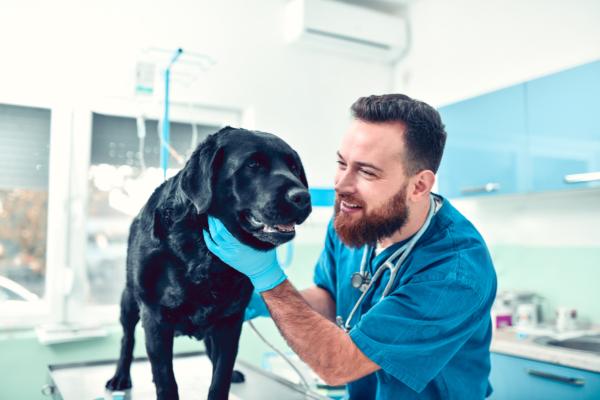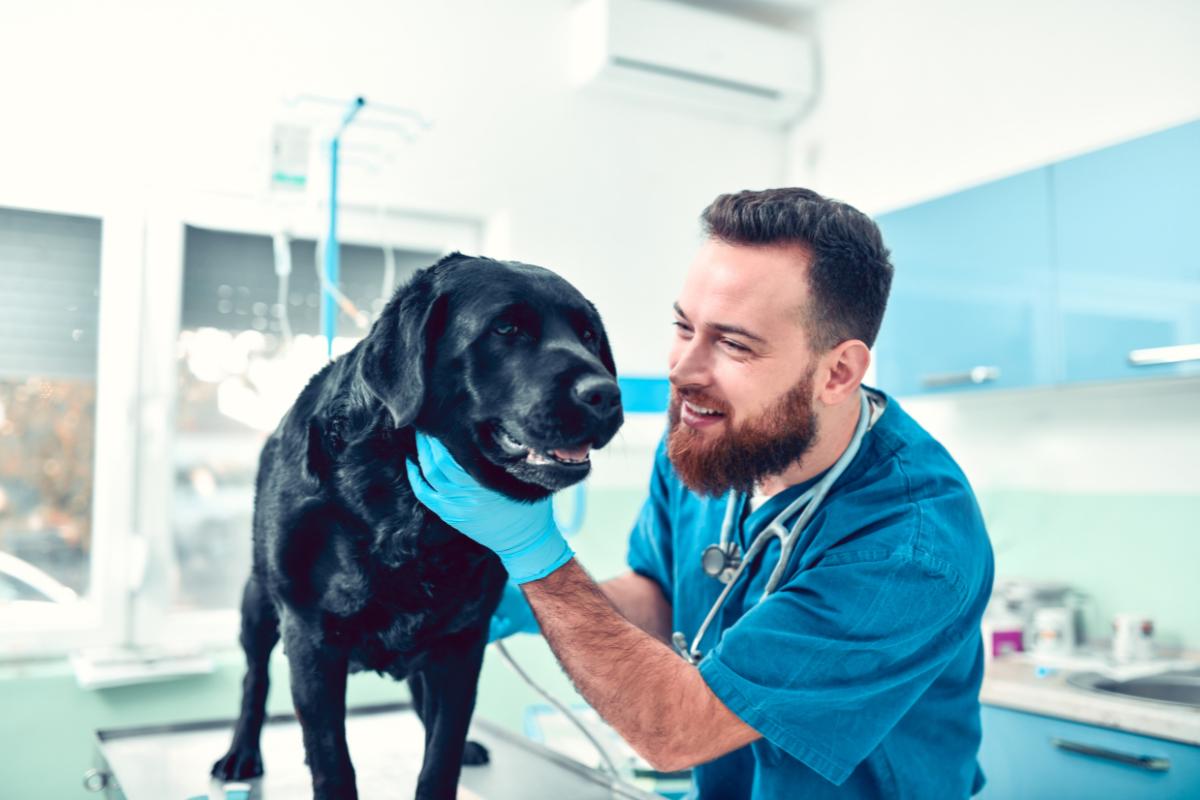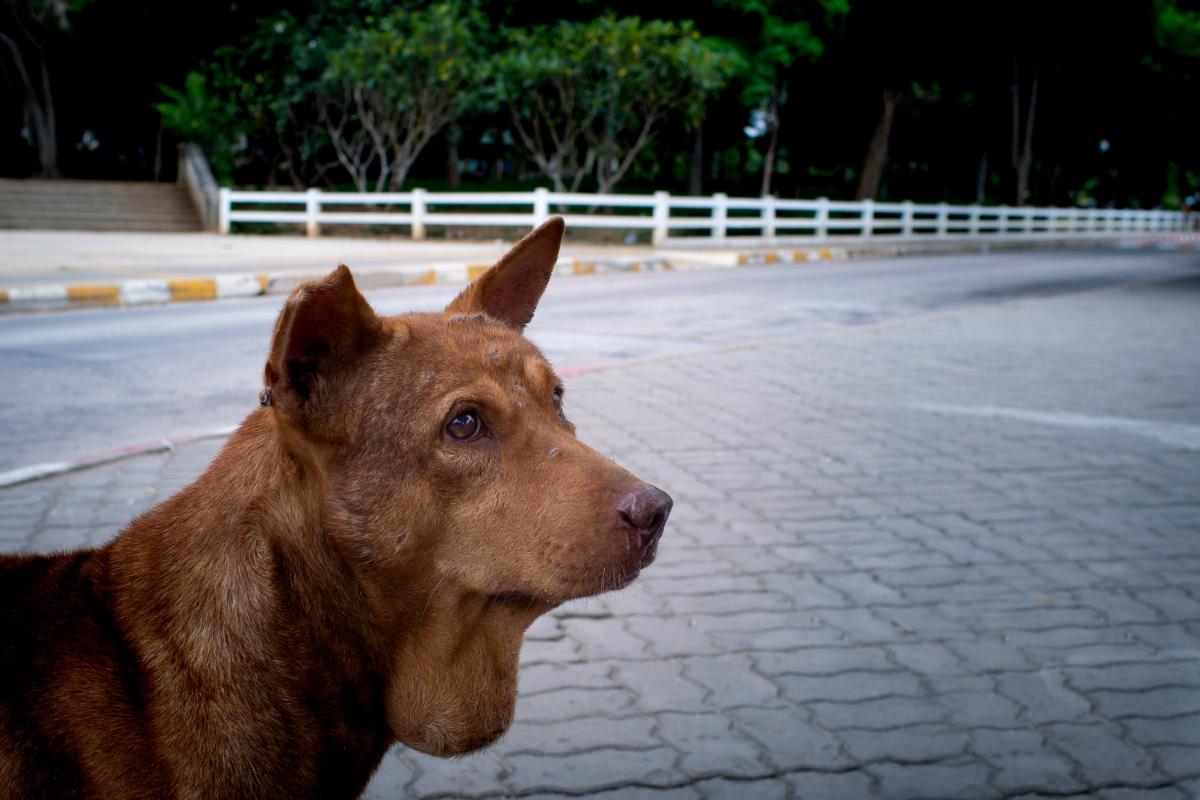My Dog Keeps Making a Gulping Sound



See files for Dogs
It is common for a dog to make gulping noises when eating, especially if they are large. While it will differ according to individual, the domestic canine is known for their voracity. Many of us need to temper this by providing smaller portions or even using special feeders to slow their food consumption. Sometimes dogs can make swallowing or gulping noises when they are not eating, even manifesting in a dog gulping attack. This might not be related to diet at all and needs to be investigated. Some of the causes of gulping noises in dogs can be due to serious health conditions.
At AnimalWised, we investigate why my dog keeps making a gulping sound. We do this by providing 8 of the most common reasons dogs have trouble swallowing.
Rhinitis and sinusitis
Rhinitis is a nasal inflammation that can spread to the sinuses. When this occurs, it is known as sinusitis. The clinical signs that cause both diseases are sneezing, thick nasal discharge with a bad smell and nausea due to the postnasal drip that occurs. This is the discharge that passes from the nose to the mouth, causing the dog to keep gulping as they are constantly swallowing mucus.
There are several infections that can trigger rhinitis and sinusitis, including viruses, bacteria, fungi or, especially in older specimens, tumors. Dental problems such as tooth abscesses can also be the underlying cause. Symptoms such as those described should make us go to the vet, since it is necessary to prescribe a treatment. This could be in the form of antibiotics or managing the symptoms until the infection passes.
Treatment of rhinitis in dogs
Since there are various causes of this inflammation, treatment is case specific. This typically includes antibiotics for bacterial infections or antifungals if fungal causes are suspected. Sometimes the underlying cause is not diagnosed, but the use of decongestants or saline nasal drops are sufficient to alleviate congestion and stop the gulping attacks. Anti-inflammatory medications may also be used to reduce swelling in the nasal passages.
Learn more about the causes and treatment of rhinitis in dogs with our related guide.
Foreign bodies
Dogs use their mouth to investigate their environment, often resulting in them swallowing foreign objects. Objects such as bone fragments, splinters, toys, long material or almost anything can become stuck in the dog's throat. If the dog isn't gulping to try to swallow the object, they may be seen with a dry cough trying to gag. We can suspect the presence of a foreign body if the dog also hypersalivates, seems to choke, cannot close their mouth or tries to touch their mouth with their paws.
Treatment of foreign bodies in dogs
It is important we take the dog to a veterinarian when a foreign body is lodged in our dog's throat. They will be able to run tests to pinpoint the location and size of the object. After this point they can determine how to remove it correctly. If we try to do the same, we run the risk of causing internal injuries to the dog which can be fatal. For example, if we try to remove sharp splinters, the movement can lacerate the soft tissues of the throat.

Pharyngitis
This is due to the inflammation of the throat, usually affecting both the pharynx and the tonsils. The dog is seen trying to gulp due to the enlarged tissues, often as a result of oral or respiratory infections. In these cases, we will notice the dog pretends to constantly swallow saliva, has a cough and develops a fever. They can also lose their appetite since it hurts to swallow.
Treatment of pharyngitis in dogs
As with rhinitis, pharyngitis is a symptom rather than a disease in itself. Such a clinical picture is reason for veterinary consultation and a differential diagnosis. The professional must determine the cause of the inflammation. Based on their assessment, they most appropriate treatment will be administered. This is likely to include antibiotics if a bacterial infection is present. Once treated, the dog should regain their appetite and be able to eat again. A soft diet for dogs may also be given, at least until the swelling subsides.
Esophagitis
Another inflammatory disease, esophagitis refers to inflammation of the esophagus. This can be due to various causes. We will notice that the dog pretends to constantly swallow saliva, they are in pain and they can be seen regurgitating. When this condition becomes chronic, the dog loses their appetite and consequently ends up losing weight. In any case, it is a problem that the veterinarian has to treat to establish the cause and its subsequent treatment.
Treatment of esophagitis in dogs
While there are various causes, esophagitis is often a result of acid reflux or the ingestion of irritants. Treatment typically includes antacids such as famotidine or omeprazole if acid reflux is the cause. Sucralfate for dogs may be used to coat and protect the esophagus. Dietary changes such as smaller, more frequent meals of low-fat, easily digestible food to prevent further irritation.
Vomiting
We may notice our dog tries to constantly swallow saliva and is restless just before vomiting. Nausea or retching is followed by visible contractions in the abdominal area and finally, a relaxation in the lower part of the esophagus occurs. This is what allows the stomach contents to be expelled through the mouth in the form of vomit. Not all episodes of nausea end like this as some may only cause retching or a feeling of unease in the dog.
Dogs can vomit easily, so it can happen in many cases without being a grave threat to the dog's well-being. For example, dogs often eat grass to make themselves vomit for various reasons.
Vomiting itself is not a disease, but it can be a symptom of many different pathologies. Some of these may be minor, as is the case with mild gastrointestinal upset. Especially when coupled with diarrhea, vomiting can also be due to serious issues such as parvovirus, kidney disease and gastric torsion. These can be life threatening, so we should never ignore this symptom, especially if it persists for more than 24-48 hours.
Treatment of vomiting in dogs
Since it has many causes, it is very important we look at the other symptoms concurrent with vomiting. If they become critical, the dog can start to slow their breathing, pass out and may eventually die. With minor symptoms, the issue might pass, but it is important to take the dog to a veterinarian right away to properly diagnose the problem and establish appropriate treatment.

Brachycephalic dog syndrome
Brachycephalic dog breeds are those that are characterized by having a wide skull and a short snout. Common examples include the Pug and the English Bulldog. Due to this compromised morphology, they can develop various health problems, especially those related to respiration. This is why these dogs often make strange sounds such as when the Pug keeps making a honking noise.
Brachycephalic dog syndrome is when several deformities such as narrowing of the nostrils, elongation of the soft palate or the eversion of the pharyngeal ventricles occur at the same time. In these cases, we can notice that the dog keeps gulping or swallowing because their airways are obstructed. In addition to gulping, they may make snorting, gurgling and sneezing noises. If the animal is at risk of asphyxiation, surgical intervention may be required.
Treatment of brachycephalic dog syndrome
In the majority of cases, there is no specific treatment for brachycephaly. Symptom management is the most common course of action for dogs with this condition. They may need to eat specialized food, have an altered exercise regimen and even have an adapted bed to help them sleep. In extreme cases, surgical intervention may be used to adjust structures such as the soft palate. Weight management is also important to help breathing.
Kennel cough
Kennel cough is a well-known canine disease, so-called because it is very contagious and can spread through dog kennels quickly. It is as a result of various pathogens which can occur alone or in combination. The most characteristic symptom is a dry cough. However, it is also common to see the dog try to swallow and gulp a lot.
Kennel cough is usually mild, but there are cases that are complicated by pneumonia. This can lead be seen to cause fever, anorexia, runny nose, sneezing and/or breathing difficulties. Puppies can get seriously sick, another reason why it is best to go to a veterinarian.
Treatment of kennel cough in dogs
Mild cases of kennel cough often resolve with rest and supportive care, but severe cases may require cough suppressants, bronchodilators or antibiotics for secondary bacterial infections. Ensuring the dog is well-hydrated and in a calm environment can also promote recovery.
Chronic bronchitis
In chronic bronchitis the dog will have a persistent cough for months. The cause is not clear, but it is known that inflammation occurs in the bronchi of the lungs. The cough will appear in fits, for example when the animal becomes very nervous or exercises. When coughing, we can also notice that the dog is gulping, since the cough can cause retching and expectorations. It shouldn't cause vomiting. It is another disease that the veterinarian has to treat to avoid complicating it and causing irreversible injuries.
Treatment of chronic bronchitis in dogs
If your dog has gulping attacks regularly, chronic bronchitis may be the underlying cause. In these cases, it is essential you take the dog to a veterinarian for diagnosis. Chronic inflammation of the airways can cause excessive mucus production and even result in respiratory collapse.
Treatment involves corticosteroids to reduce airway inflammation, bronchodilators to improve airflow, and antibiotics if a secondary infection is present. Environmental changes such as reducing exposure to smoke or allergens, are crucial for long-term management.

Tumors
The location of a tumor can have different effects on a dog's organism. This results in changes to the clinical picture, in addition to the type of neoplasm involved. If the dog has a lump in their throat due to a tumor, it can cause them physical discomfort which results in the dog swallowing and gulping all the time. A neoplasm can even become sufficiently large that it obstructs the passage of food down to the stomach.
Not all tumors will be malignant, but even benign tumors in this area can cause serious health problems. Those that are cancerous can spread and will likely be fatal if left untreated.
Treatment of tumors in dogs
Some small canine tumors such as fatty lipomas will not cause any serious threat to the dog's health. Treatment may be deferred unless there is a change to their quality of life. If the location causes issues such as gulping attacks or making it difficult to swallow food, then removal may be required even if it is benign. For cancerous tumors, surgical removal will be used where possible. This is often performed in conjunction with other treatments such as radiotherapy or chemotherapy.

This article is purely informative. AnimalWised does not have the authority to prescribe any veterinary treatment or create a diagnosis. We invite you to take your pet to the veterinarian if they are suffering from any condition or pain.
If you want to read similar articles to My Dog Keeps Making a Gulping Sound, we recommend you visit our Other health problems category.
Carlson and Giffin. 2002. Practical manual of canine veterinary medicine . Madrid. Editorial el Drac.








